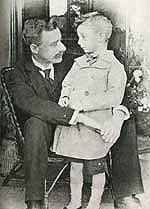 |
Department Electra House |
Despite their differences the British and French arranged for leaflets to be printed and then carried to their destination by balloon. However, the French were unimpressed by the British efforts, complaining of grammatical mistakes and words wrongly employed.
Eventually war became inevitable and with London as a primary target a relocation to a safer refuge took priority. As a member of the staff and a

As his recruitment officer Campbell Stuart had been fortunate in the choice of Valentine Williams, an author he had known many years earlier at the Daily Mail and by his efforts, Noel Coward, who had left for France in the second week of the war, became engaged for the Department’s Paris office.
During the ‘phoney war’ Campbell Stuart, accompanied by his private secretary, Anthony Gishford and Dallas Brooks, paid several visits to Paris in connection with the departmental duties and they happened to be in Paris on the day that the Germans invaded Poland. Campbell Stuart now decided that his duty lay with the Department in England and making arrangements to finalise matters in France, he reserved places on the 4 o’clock train. Having briefed the French authorities on the propaganda arrangements, he then returned to his hotel but now there were doubts as to whether the 4 o’clock train would actually run. Instead he despatched his staff to secure a car and eventually they found a black Hispano in the Place de la Concorde. On receipt of a telephone message, to confirm that the Woburn operation had been mobilised, he and his party then climbed into the vehicle and made for the port of Boulogne. Yet near the town the car suffered a puncture and in consequence the last boat had already left by the time they arrived. A frantic telephone call to Dieppe revealed that a night boat would shortly sail and making off at full speed the party arrived just in time and made their connection to England, eventually arriving at Woburn.